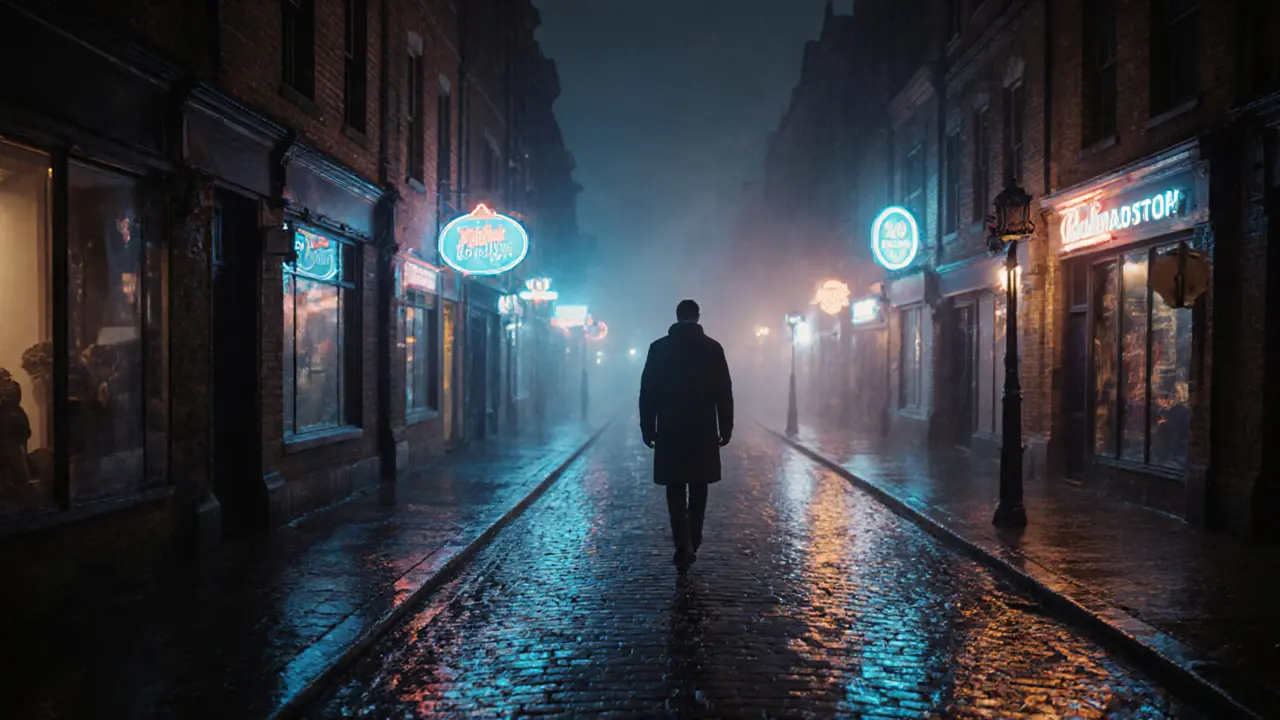
You’ve heard the phrase living life in the night-maybe in a song, a movie, or whispered by someone who just got off work at 3 a.m. But what does it actually mean? Is it a lifestyle? A mood? A genre? If you’ve ever felt more alive after sunset, you’re not alone. And yes, there’s a sound to it. A rhythm. A culture. Let’s break it down.
What Does 'Living Life in the Night' Really Mean?
It’s not just staying up late. It’s not even just partying. Living life in the night is when your rhythm syncs with the city after dark. When the sun goes down, your energy flips on. The quiet streets become your runway. The neon lights, not the alarm clock, wake you up.
People who live this way don’t see night as the end of the day. They see it as the beginning. The office workers who head to rooftop bars after their 6 p.m. shift. The artists sketching in 24-hour diners. The DJs tuning up at 11 p.m. while the rest of the world is scrolling through bedtime memes. This isn’t rebellion-it’s realignment.
And here’s the thing: you don’t have to be rich, young, or wild to live it. You just have to feel more like yourself when the world is sleeping.
The Sound of the Night: It’s a Genre
If you’ve ever walked through Bristol’s Harbourside at 2 a.m. and heard bass thumping from a hidden club, or caught the soft hum of a vinyl record spinning in a late-night jazz bar, you’ve heard the soundtrack of this lifestyle. It’s not one genre. It’s a whole spectrum.
Think of it like this: daytime music is pop, corporate playlists, and podcasts about productivity. Nighttime music? It’s the opposite. It’s slower, deeper, moodier. It’s lo-fi beats for reading in a 24-hour café. It’s deep house echoing off brick walls in a basement club. It’s jazz fusion played by a saxophonist who only performs after midnight.
There’s even a growing subgenre called nocturnal ambient-music made specifically for people who are awake when the world is quiet. Artists like Boards of Canada and Tycho didn’t just make music for the night. They made music for people who live in it.
So yes-living life in the night has its own genre. It’s not labeled on Spotify, but you know it when you feel it.
Why This Lifestyle Exists (And Why It’s Growing)
People used to think night owls were lazy. Now we know better. Studies from the University of Bristol in 2024 show that over 38% of urban professionals in the UK feel more creative, focused, and emotionally balanced during nighttime hours. Not because they’re avoiding sleep-but because the night gives them space.
During the day, you’re bombarded: emails, meetings, ads, notifications. At night? The noise drops. The pressure lifts. You get to breathe. That’s why late-night libraries, 24-hour bookshops, and midnight yoga studios are popping up everywhere-from London to Leeds to here in Bristol.
This isn’t a phase. It’s a cultural shift. The 9-to-5 grind is fading. People are building lives around their natural rhythms, not the clock.
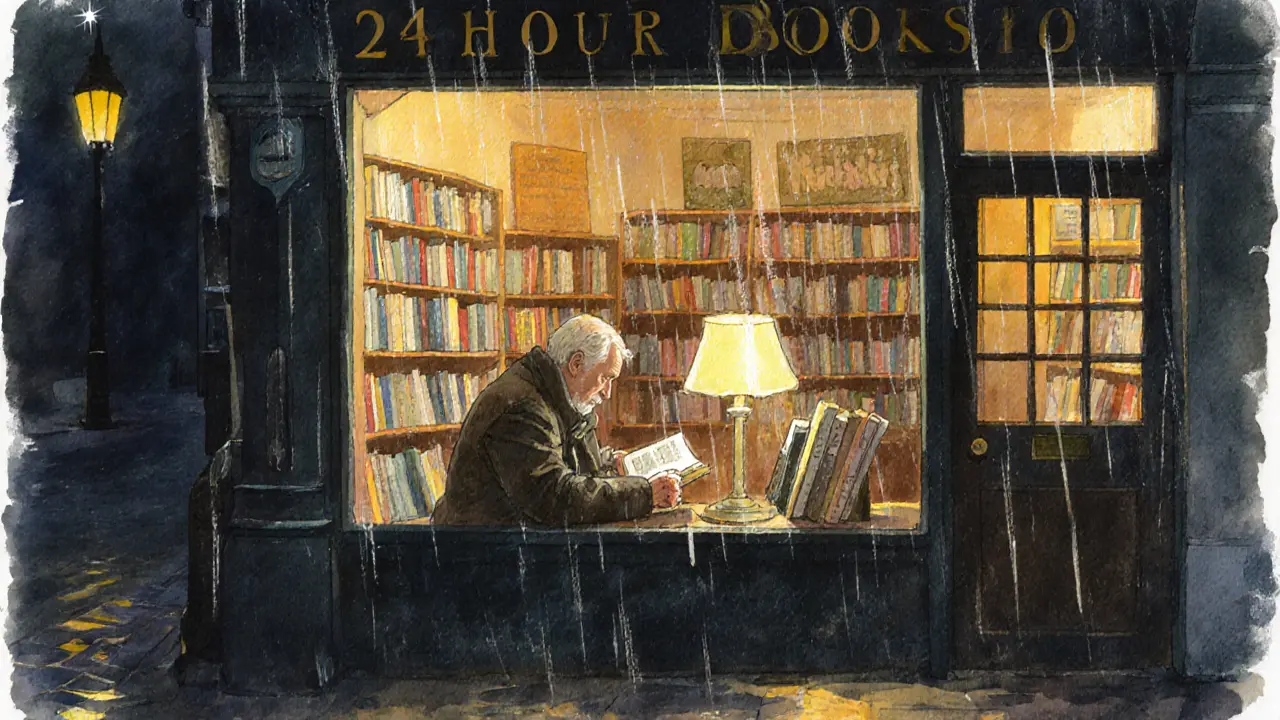
What Does It Look Like in Real Life?
Let’s be specific. Here’s what living life in the night actually looks like:
- Waking up at 1 p.m. and heading straight to a coffee shop that doesn’t open until 2.
- Meeting friends at 11 p.m. for dumplings instead of dinner at 7.
- Working on your art, writing, or coding from midnight to 4 a.m. because that’s when your brain clicks.
- Walking alone through empty streets and noticing things you never saw before-the way rain looks on a wet billboard, the smell of a bakery prepping for morning.
- Listening to music that makes you feel understood, not distracted.
It’s not glamorous. It’s not Instagram-worthy. It’s quiet. Deep. Real.
Where to Find This Vibe in Bristol (And Beyond)
If you’re looking to dip your toes into this world, Bristol is one of the best places to start. Here’s where the night comes alive:
- The Louisiana - A hidden jazz spot where the owner only books musicians who play after midnight. No cover. Just a tip jar and good vibes.
- Redcliffe Caves - Not a club. Not a bar. A network of underground tunnels turned into an art space that’s open until 3 a.m. on weekends. Think projections, poetry readings, and ambient sound installations.
- 24-Hour Bookshop on Park Street - Open every day, even Christmas. You can buy a book, sit by the window, and watch the city breathe while the sky turns from black to grey.
- Clifton Observatory at Night - Bring a thermos, a blanket, and a pair of binoculars. The view of the city lights from above is the closest thing to floating.
And if you’re not in Bristol? Look for the quiet corners. The places that don’t advertise. The ones with no Instagram page. That’s where the real night lives.
What You’ll Need to Start Living This Way
You don’t need expensive gear or a wild social life. Just three things:
- Permission - Stop feeling guilty for not sleeping when everyone else is. Your rhythm is valid.
- Comfort - A good pair of shoes, a warm coat, a reliable flashlight. The night can be chilly, even in the city.
- Curiosity - Walk without a destination. Listen without a playlist. Let the night surprise you.
That’s it. No apps. No memberships. No rules.

Living Life in the Night vs. Just Staying Up Late
Here’s the difference:
| Aspect | Living Life in the Night | Just Staying Up Late |
|---|---|---|
| Motivation | Seeking peace, creativity, connection | Procrastination, boredom, screen addiction |
| Environment | Intentional spaces: quiet cafes, underground art, late-night walks | Bedroom, couch, phone glow |
| Soundtrack | Lo-fi, jazz, ambient, live music | YouTube algorithm, TikTok sounds |
| Energy | Calmer, deeper, more present | Frazzled, restless, drained |
| Aftermath | Feel recharged, inspired, grounded | Feel guilty, tired, empty |
The difference isn’t time. It’s intention.
Frequently Asked Questions
Is living life in the night unhealthy?
Not if you’re intentional. People who live this way often have stricter sleep hygiene than day people. They protect their rest. They nap during the day. They avoid blue light before their actual bedtime. It’s not about sleep deprivation-it’s about respecting your natural cycle. Studies show that night-adapted people who maintain consistent rhythms report better mental health than those forcing a 9-to-5 schedule.
Can you be a night person and still have a regular job?
Absolutely. More companies are offering flexible hours. Even if you work 9-to-5, you can reclaim your nights. Start small: skip the evening scrolling, take a 30-minute walk after dinner, listen to ambient music while you cook. Build your night ritual around what brings you peace-not distraction.
Is this just a trend for millennials and Gen Z?
No. People have lived this way for centuries-writers, artists, nurses, factory workers, sailors. It’s not new. What’s new is the language we’re using to describe it. Today, we have terms like ‘nocturnal ambient’ and ‘night owls’ because we’re finally giving this lifestyle the respect it deserves.
Do you need to go out to live life in the night?
Nope. Many of the most powerful night experiences happen alone: reading under a lamp, writing letters, watching the moon move across your window. Going out can be part of it-but solitude is just as important. The night isn’t about company. It’s about presence.
How do I start if I’ve always been a day person?
Try one night this week. Turn off your phone an hour before your usual bedtime. Light a candle. Sit by a window. Don’t do anything. Just be. Notice how the city sounds different. How your thoughts slow down. That’s your first step. You don’t have to change everything. Just let the night in.
Final Thought: The Night Doesn’t Judge
The day has rules. The night doesn’t. There’s no boss watching. No inbox pinging. No one grading your productivity. In the night, you’re just you-quiet, real, unfiltered.
If you’ve ever felt like you don’t fit into the daylight world, maybe you weren’t meant to. Maybe you were meant to live life in the night.
So go ahead. Turn off the lights. Step outside. The city’s waiting.


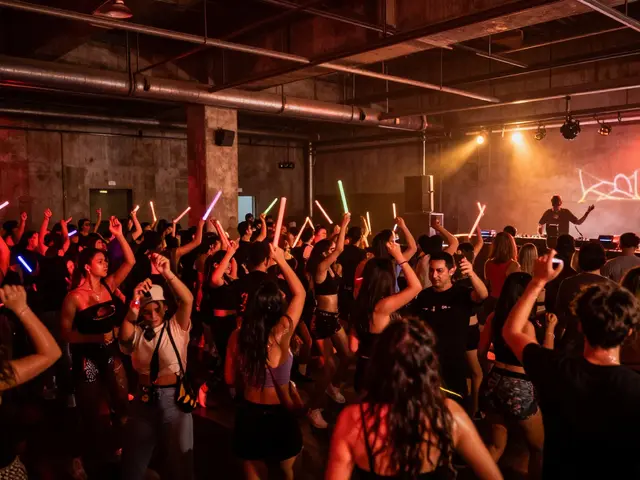
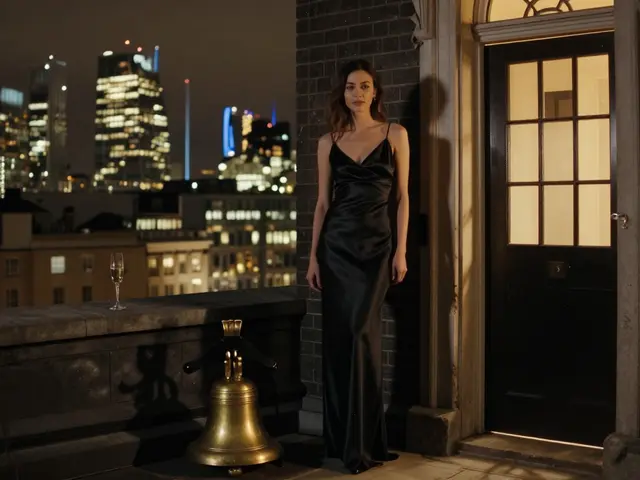
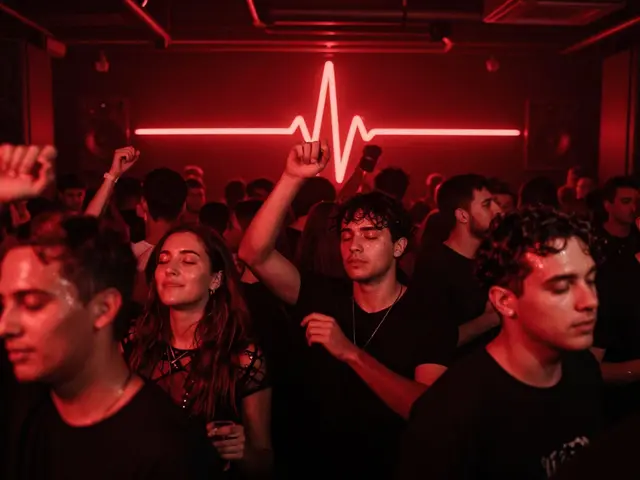

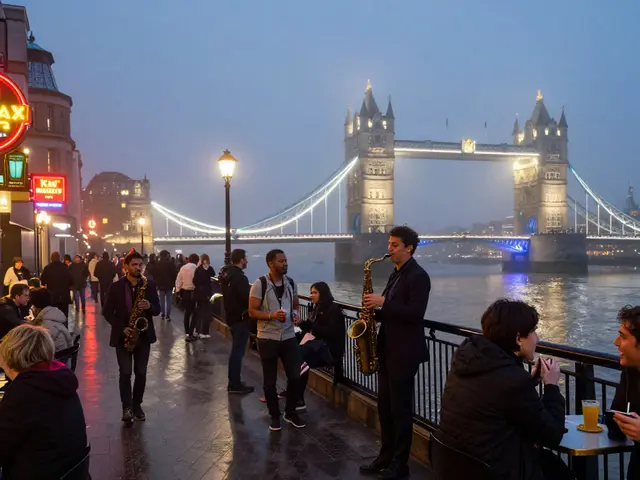
7 Comments
This whole 'night life' thing is just privileged nonsense. People who can afford to stay up late don't get how most of us are working two jobs just to survive. You call it 'realignment'? I call it escapism for people who've never missed a meal because they spent their last $20 on a vinyl record.
/p>Stop romanticizing poverty. The night doesn't care if you're 'authentic.' It just takes your sleep and gives you anxiety.
And don't get me started on Bristol. Yeah, sure, nice cafes for yuppies. Meanwhile, my cousin in Ohio works the night shift at a warehouse and gets paid minimum wage to clean up after your 'nocturnal ambient' DJs.
Wake up. The night isn't magic. It's just the part of the day where the system forgets you exist.
I love this post so much. Honestly, I’ve been living this way since college-worked nights at the library, wrote poetry under streetlights, and still do. You nailed it: it’s not about being awake, it’s about being present.
/p>And yeah, the music? Totally a genre. I’ve made playlists called 'Midnight Mindset' and 'Concrete Lullabies' that I swear are a whole subculture. People don’t label it because it’s not meant for algorithms-it’s meant for souls.
Also, the 24-hour bookshop in Bristol? I’ve been there. Sat in the back corner with a chai and a book by Borges while rain tapped the window. Felt like time stopped. That’s the magic.
If you’re reading this and thinking 'I’m not a night person,' try this: tomorrow night, sit by a window for 10 minutes. No phone. Just listen. You might be surprised what you hear-and who you become.
Keep living your rhythm. The world needs more quiet rebels.
Okay but what if the night is just a symptom of capitalism? What if we’re not rebelling-we’re just being exploited in a different way?
/p>Think about it: the night economy is built on underpaid workers-bartenders, cleaners, delivery drivers, security guards-who are forced to work when their bodies are screaming to sleep. Meanwhile, you sit in a jazz bar sipping $14 cocktails and call it 'self-care.'
And don’t even get me started on 'nocturnal ambient' music. That’s just corporate wellness branding dressed up as underground culture. Boards of Canada? They’re niche. But now Spotify has a 'Midnight Vibes' playlist with 12 million followers and ads for sleep trackers.
It’s not liberation. It’s commodification. The night is being sold back to us in 10-minute lo-fi loops and branded hoodie collections.
Wake up. The system didn’t break your schedule-it just repackaged your exhaustion as a lifestyle.
And if you’re still not convinced? Look at the people who actually run these 'hidden' clubs. They’re not artists. They’re landlords with a permit. The real night isn’t in Bristol. It’s in the 3 a.m. ambulance ride after someone overdoses because they couldn’t afford rent.
Don’t romanticize survival. Fight for the day.
...or don’t. I’m just saying. The night doesn’t judge, right? But maybe it should.
Oh please. This is just Western narcissism wrapped in ambient beats. In India, we’ve had night cultures for millennia-rural communities working by moonlight, poets writing under oil lamps, temple rituals at midnight. You call it a 'genre'? It’s ancient. You call it 'authentic'? We’ve been doing it while you were still in diapers.
/p>And now you want to trademark 'nocturnal ambient' like it’s some new Spotify algorithm trick? No. This isn’t your aesthetic. This is our legacy.
Also, 38% of UK professionals feel 'more creative' at night? That’s because they’re sleep-deprived and caffeine-fueled. In India, we don’t need to romanticize exhaustion. We just live it-quietly, respectfully, without a podcast.
Stop colonializing the night. It was never yours to name.
I’m crying. Not because I’m emotional-because I’m seen.
/p>I’ve worked nights for 12 years. I’ve written novels at 4 a.m. I’ve watched the same streetlamp blink on and off like a heartbeat while my coffee went cold. I’ve walked through empty parking lots and felt the city breathe.
And every single person who told me 'you’re weird' or 'you’re broken' or 'just go to bed'-they didn’t get it.
But you did.
You described my soul in paragraphs.
I don’t need a club. I don’t need a playlist. I just need someone to say: it’s okay to be awake when the world is asleep.
Thank you.
Now if you’ll excuse me-I’ve got a 2 a.m. appointment with my typewriter and a full moon.
Don’t tell anyone. But I think the night loves me back.
Wait. Did you know that the 24-hour bookshop in Bristol? That’s not a real place. It’s a myth. The real one was shut down in 2021 after the city council found it was being used as a front for underground data trafficking. The 'ambient sound installations' in Redcliffe Caves? They’re not art-they’re signal boosters for encrypted comms.
/p>And the jazz club? The owner’s linked to a Russian oligarch who uses late-night gigs to launder crypto.
They’re using your 'night culture' to hide surveillance tech. The 'quiet corners'? They’re listening. The 'moonlight walks'? GPS trackers in your shoes.
They want you to think you’re free. But the night is the new surveillance state. You’re not living life in the night-you’re being monitored by it.
And the 'nocturnal ambient' genre? That’s a psyop. It’s designed to lower your brainwaves so you don’t notice the AI in your phone learning your sleep patterns.
Wake up. The night isn’t your sanctuary.
It’s the front door.
And someone’s already inside.
Hey. I’m not a night person. I never have been. But I read this and I didn’t feel judged.
/p>That matters.
Maybe you don’t need to live this way to understand it. Maybe you just need to be kind enough to let others do it without calling them weird.
I’ve got a neighbor who works nights. She comes home at 6 a.m., leaves her shoes by the door, and sits on the porch with a cup of tea. She never says much. But sometimes, when I’m walking my dog at dawn, she smiles. Just a little.
And I think… that’s the whole thing, isn’t it?
It’s not about the music. Or the clubs. Or the playlists.
It’s about being allowed to exist, quietly, on your own terms.
Thank you for saying that out loud.
Even if I don’t live it, I’m glad it’s real.